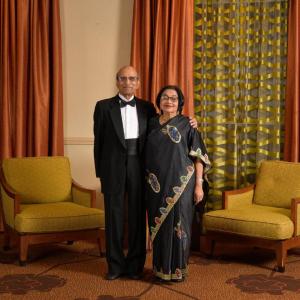After a half-century of teaching, a professor and his wife look to the future of the School of Medicine
Krishan Chandar, MD, arrived in Cleveland in 1974 to complete his neurology residency, eager to bring the education and expertise he was gaining in the United States back to India to advance care in his home country.
He never left.
Now, the 90-year-old associate professor emeritus of neurology and his wife, Sneh, have secured a place not only in the school’s history, but also in its future. Through an estimated $1 million estate gift, the Dean’s Scholars Program will be re-established as the Dr. Krishan Chandar and Sneh Chandar Dean’s Scholars Endowment Fund.
Its goal: to support postdoctoral scholars—especially those from underrepresented backgrounds—as they pursue tenure-track faculty positions in medicine, through stipends, research funding or other professional development initiatives.
“I’ve always felt that education is a way to advance, but there is still so much inequality that exists,” Chandar said. “There are many people in this country who have not been given the opportunity to succeed because of their race. They deserve help to advance, and we need to be able to expand their presence in the educational field.”
The fund is an opportunity for Chandar to support the career trajectories of young scholars—just like a Case Western Reserve professor did for him at the start of his career. Joseph Foley, MD, who was the head of neurology in the ’70s, offered Chandar a post-residency faculty position just weeks into his time in Cleveland.
Chandar was eager to work with the esteemed neurologist, but there was a problem: Chandar had come to the U.S. on a five-year J1 visa and, after a two-year residency at Baylor College and weeks into his new rotation in Cleveland, his time was running short.
Foley advocated for the university to apply to convert Chandar’s J1 visa to immigrant status. After an “extremely difficult, contentious” months-long process, Chandar got clearance—a “joyous” occasion for him, his wife and two young children.
Over his 50 years in Case Western Reserve University School of Medicine’s Department of Neurosciences, Chandar introduced “live patient demonstrations,” bringing a new patient each week in front of a crowd of 80 students to help understand and diagnose their illnesses. He initiated teaching activities for all third-year neurology residents. He wrote nine of the school’s 10 IQ cases when the school launched its WR2 curriculum in 2007—and then facilitated the small-group learning activities.
Chandar’s approaches were so effective that medical students recognized him with multiple awards, including two of the school’s highest teaching honors: the Gender Equity Award and the Kaiser Permanente Award.
He retired from his clinical role in 1999 and since has devoted time to enhancing the neurology program’s curriculum. Chandar said he still meets weekly with some neurosciences faculty to discuss advancements and lectures to third-year medical students up to twice a month.
“I have such a gratitude to these students,” Chandar said. “Because of them, I can still teach—and they really keep me young.”
He’s also devoted to lifelong learning, whether that’s through the university’s Emeriti Academy Book Club or ballroom dancing lessons with Sneh (they’ve mastered eight different dances).
“We had a wonderful life here,” Chandar said. “We made the best decision by choosing Case Western Reserve and Cleveland.”
Originally published in the summer 2024 issue of Forward Thinking magazine


